Employment and Benefits
Policy and Basic Concept
In running a global business in a wide range of domains, more than 110,000 consolidated employees as of the end of FYE 2025 join together to operate as the ITOCHU Group. ITOCHU Corporation is implementing various initiatives that aim to create a working environment where our diverse body of employees can reach their full potential. Some of our notable initiatives include: enhancing our early morning-focused work system to promote work-style reforms, the establishment of various systems to support employees with caring duties, and the promotion of social activities among employees at our recreational facilities.
ITOCHU’s Code of Ethical Conduct stipulates respect and consideration for human rights. Furthermore, ITOCHU’s labor standards have been formulated in accordance with the principle of Elimination of Discrimination in Respect of Employment and Occupation of the International Labour Organization (ILO)’s Declaration on Fundamental Principles and Rights at Work (and its Follow-up).* For this reason, ITOCHU adheres to the statutory minimum wage and applies a consistent compensation system for the same qualifications and position level (equal pay for equal work) and without gender discrimination, and develop a challenging but rewarding work environment.
- The ITOCHU Group expresses its support to the Declaration through its Human Rights Policy, Section 2. Endorsement of International Agreement.
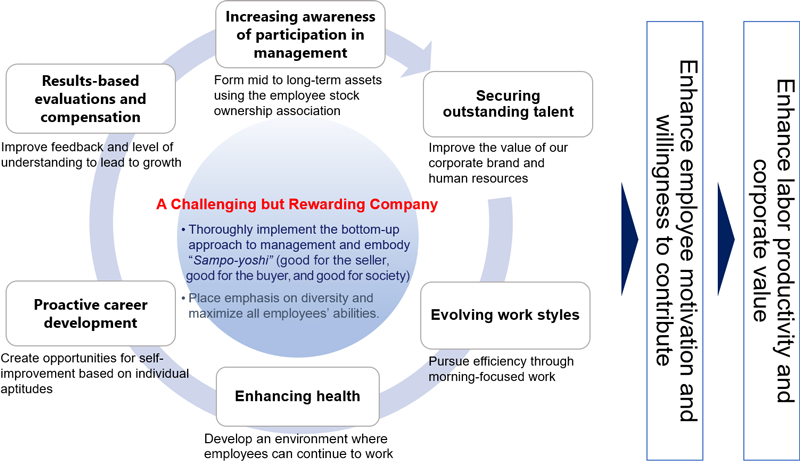
Targets and Action Plan
| Risks | Opportunities |
|
|
* Percentage of taking employee acquiring paid leave; 52.6% in FYE 2021, 58.8% in FYE 2022, 62.2% in FYE 2023, 64.7% in FYE 2024.
Structures and Systems
When Group companies in Japan and overseas develop business in their respective domains and regions, the Division Companies of ITOCHU Corporation, the parent company, take the lead depending on the business area. The company presidents secure human resources and put the right person in the right position in accordance with laws/ordinances under the human resource strategy based on the management strategy. Furthermore, ITOCHU supports the creation of a management structure for ensuring that Group companies provide optimal labor environments for their employees.
Risk Assessment for Labor Practices in Business Investments and Financing Projects
When assessing potential investment and financing projects, in addition to economic aspects, ITOCHU uses an ESG checklist to identify and assess key ESG (environmental, social, governance) concerns relevant to the project, which includes topics related to labor practices – e.g. working conditions, occupational health and safety and stakeholder dialogue. We also monitor the progress and performance of our existing investment and financing projects and take necessary measures to make improvements.
For further details, please refer to the ESG Risk Assessment for New Business Investment Projects.
Ensuring Compliance to Labor Standards
At ITOCHU, it is mandatory for employees upon recruitment to complete training on working conditions, which includes issues related to salary, working hours and holidays, occupational safety and health, benefits, and service regulations. We are working to ensure all employees comply with the labor standards of ITOCHU by making them available at all times on the Intranet in both Japanese and English. For domestic and overseas group companies, in addition to supporting the development of optimal work environments, we are also promoting the adoption of labor standards equivalent to ITOCHU standards.
In addition, ITOCHU continues to dispatch HR staff every year to the Tokyo Labor University Lectures held by the Japan Institute for Labor Policy and Training, an affiliated organization of the Ministry of Health, Labour and Welfare. Based on the current situation regarding human resources and labor management in general, including skill development, working hours and compensation, the course systematically teaches the structure of wages, the current issues of the modern labor market with its increasingly diverse employment patterns and the state of labor-management relations from the perspective of labor economics.
Employee Engagement
ITOCHU Corporation believes that continuing to raise the level of employee engagement will improve corporate value.
We conduct an engagement survey* and disclose the result every year to identify and address issues in a timely manner, thereby establishing a PDCA cycle. To assess progress swiftly and accurately on these measures, we report the identified issues, etc. to the management, and decide on new measures and improvements. From this survey, we have identified issues such as “fostering job satisfaction among junior and mid-career employees,” “sharing personnel and ideas beyond the boundaries of organizations,” and “responding to diverse values.” After discussing possible solutions to these challenges at management meetings, we are now implementing concrete key measures. As a result, we have confirmed improvements in the scores of related survey questions. We will continue to promote initiatives aimed at realizing a “challenging but rewarding workplace,” with management and frontline employees working together as one, in order to ensure that employees are proud of working for ITOCHU Corporation, maintain a strong motivation to contribute to the company, and voluntarily seek to deliver results that exceed expectations.
- To ensure objectivity and transparency, this survey is conducted by having respondents answer directly and anonymously to an external contractor with questions such as motivation, happiness, stress, etc. The survey is administered once a year to all employees.
Recent Engagement Survey Score
| FYE 2023 | FYE 2024 | FYE 2025 | |
| Engagement Score | 67 | 68 | 68 |
- The score is affirmative response (%)
Promotion of Work-Style Reforms
As a business managed by a small group of people, ITOCHU Corporation believes that employees are its greatest asset, and that individual employees exerting their full potential will lead to improvement in corporate value. Since FYE 2011, we have aggressively promoted work-style reforms as we implement various measures aimed at creating an environment that allows all employees to apply their unique traits and feel secure as they focus on their work.
Evolving Our Morning-Focused Work System / Managing Work Time
Our morning-focused work system, adopted in October 2013, has promoted workstyles that reflect the ITOCHU philosophy by encouraging a mindset among employees: leaving work early in the evening and coming to work early in the morning leads to more efficient work. This also had a significant impact on society by serving as a positive case study for the government’s initiatives related to reducing long work hours.
The results of the employee engagement survey conducted in December 2021 pointed out a need for further initiatives related to supporting diverse workstyles. In response, in May 2022 we adopted a morning flex-time structure. We also adopted telecommuting. These initiatives allow early work start and end times, enabling them to dedicate their free time to self-improvement, child care, and family care. These initiatives help increase motivation and lead to improvements in work productivity and in our corporate value.
In addition to ensuring compliance with labor union agreements and relevant laws, we will promote further work-style reforms as a method of reducing total work hours.
ITOCHU believes its initiatives as a pioneer in work-style reform will both empower individual employees to change their approach to work, and promote balanced operational reforms. In this way, the Company is striving to achieve a work environment that enhances operational effectiveness, helps maintain and improve employee health, support the activities of employees who face time constraints from raising children or caring for family members in poor health and allows a more diverse set of employees to make full use of their capabilities.
Change in Labor Productivity with FYE 2011 as a Value of 1
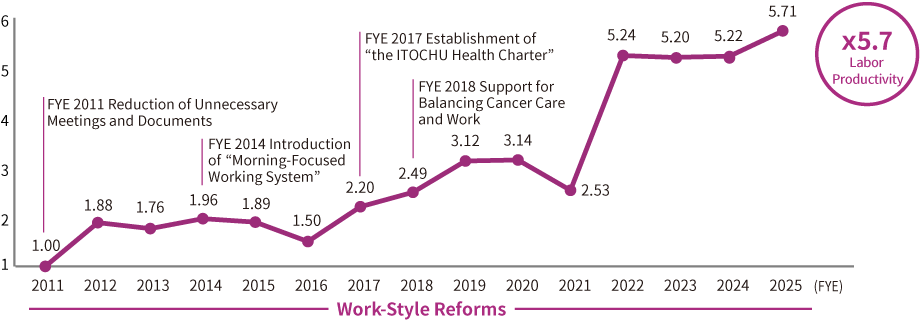
Outline of Initiatives
Morning-Focused Work System Diagram

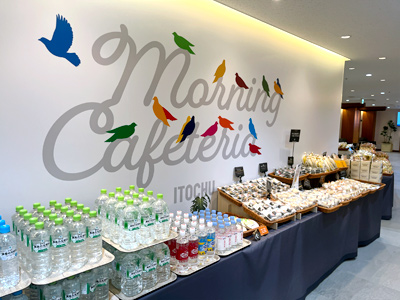
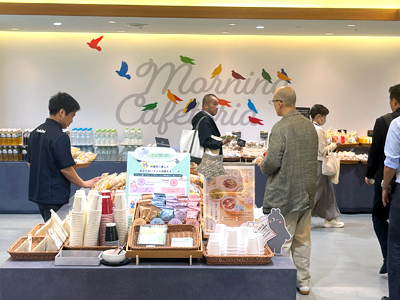
- In principle, prohibit work between 8:00 pm and 10:00 pm and shift any remaining work to the next morning. 5:00 am to 8:00 am is the recommended timeframe for starting early morning work.
- For employees who start work before 7:50 am, up to 9:00 am pay the same overtime rate (25%) as employees who work overtime as an incentive.
- Work between 10:00 pm and 5:00 am is prohibited.
- We distribute three snacks to employees who arrive at work before 8:00 a.m.
Balancing Work with Childcare and Nursing Care
ITOCHU Corporation goes above and beyond the requirements of the law to arrange programs that help employees, regardless of gender, to balance work with childcare and nursing care. This allows the employees to continue making full use of their skills during their careers at the company, while remaining confident that they can handle stages of life where they must take care of children or elderly family members at home. In FYE 2017, in addition to introducing a lactation space, we introduced a telecommuting program for employees who meet certain conditions. Eligible employees include those with time constraints due to childcare or nursing care obligations, as well as those who face difficulty making the commute to work due to pregnancy, illness or other such reasons. We expanded the program to make all employees eligible starting in May 2022.
The number of male employees wishing to take childcare leave has been increasing, with the allowance for balancing childcare and work* introduced in FYE 2023 being a key driver. In response, after discussing in Women’s Advancement Committee, ITOCHU has made it mandatory for male employees to take childcare leave (paid leave), starting from FYE 2025. As a result, childcare leave acquisition rate of male employees for FYE 2025 was 100%. In addition to improving the job satisfaction of male employees, we believe that encouraging male employees to participate in childcare will foster a corporate culture that respects diversity and will lead to further support for female employees.
- A certain amount of allowance to subsidize for the extra cost (childcare cost, etc) in case an employee takes more than 4 weeks of childcare leave and returns to work before the child turns 1-year old.
In addition, we continue to hold nursing care seminars every year in light of the fact the importance of preparing for nursing care has also become a social problem. At the same time, we introduced a service to provide nursing care information online in FYE 2018. We then introduced a one-stop nursing care assistance service to meet the needs of those seeking advice in April 2019.
Support Programs for Balancing Work with Childcare and Nursing Care
Support for Childcare
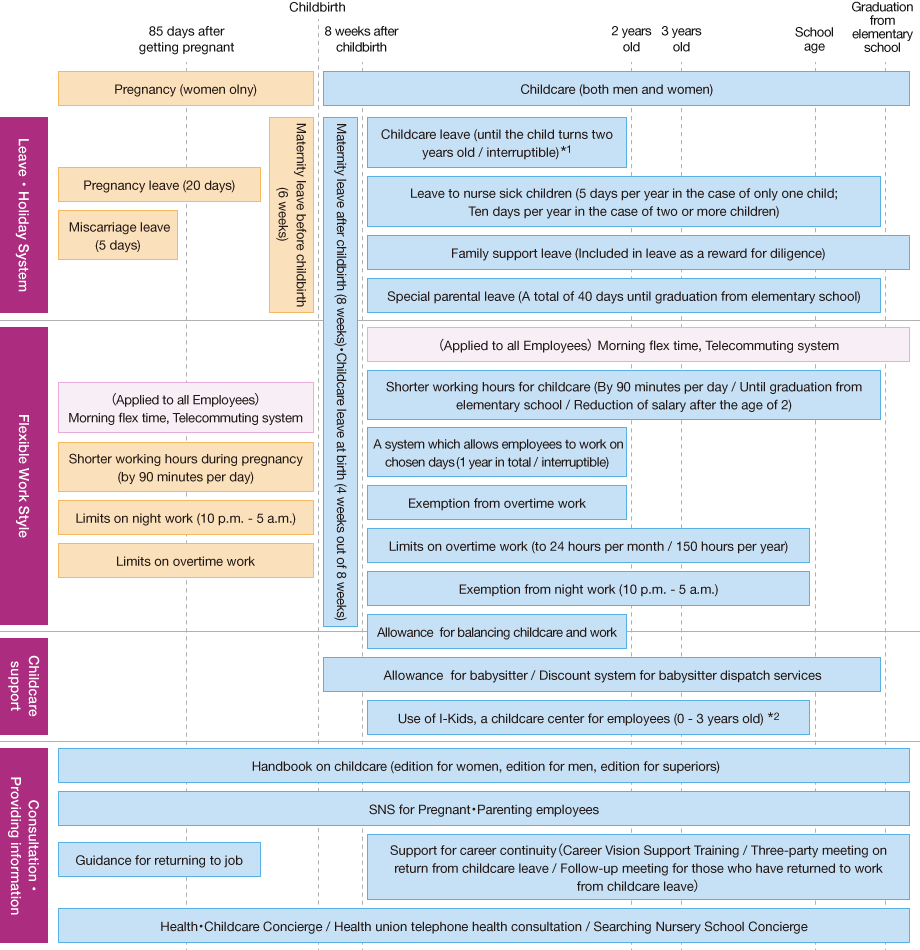
- Among the systems for taking time off or leave, only Childcare leave is unpaid. All other types of leave are paid.
- Temporary childcare services are available until the child reaches school age.
Support for Nursing Care
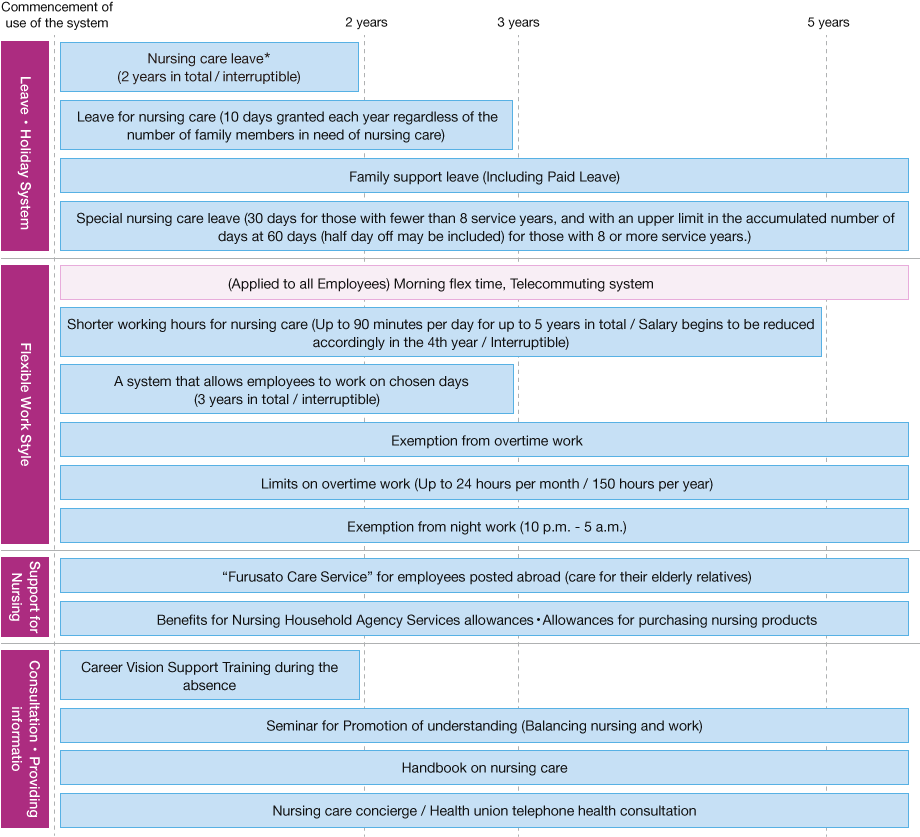
- Among the systems for taking time off or leave, only Nursing care leave is unpaid. All other types of leave are paid.
Use of Childcare and Nursing Care Programs★
For details, please refer to ESG Data.
Reemployment System
If an employee who chose to leave the company wishes, he or she can register with our reemployment system for five years. During the registration period, we devise ways in which to keep that employee in contact with our company. For example, we bear the cost for self-improvement and send corporate information.
ITOCHU Kids Day for Visiting Mom and Dad at Work
Since 2014, we have regularly invited employees’ elementary-age children to ITOCHU Kids Day for Visiting Mom and Dad at Work. The children come to work early in the morning with their parents, and participate in the event after eating a morning snack provided by the company. This event gives them an experience of morning-focused work. We also provide business cards personalized with their names made especially for the event, which they use exchange with their parents’ colleagues. They also attend a mock meeting in the executive meeting room and eat lunch in the employee cafeteria. These activities provide the children with a deeper understanding of the company where their parents work. The response from employees has been very positive for instilling an interest in what the children’s parents do at their job and for sparking a desire to work at ITOCHU in the future. As we consider this an incredibly meaningful event for building family bonds and teaching children about ITOCHU, we plan to continue holding it.
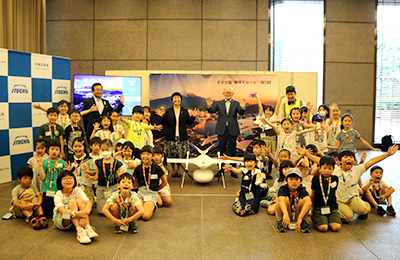
Since 2023, ITOCHU has been holding a workplace after-school program I-SUMMER School as ITOCHU Kodomo Domannaka Week (translates to a week dedicated to children at the very core). With the increasing demand for high-quality after-school programs, we set up a program during August, which is the school summer break, where the children can experience ITOCHU’s original work-style reform, the morning-focused working system, working in office, and learn about ITOCHU’s business, history, and global mindset through ITOCHU’s original contents. This program is not limited to the children of ITOCHU employees but extends its reach to students from neighboring community, strengthening our ties with the local community. Since 2024, we have held I-SPRING School in March during school spring break. We have accepted around 580 children in total including children from the neighboring school. We will continuously strive to work towards creating a society where children can grow healthily and happily.
Employee Benefits
ITOCHU Corporation employs a variety of welfare facilities and schemes to stimulate communication between employees and provide opportunities for exchange. Stimulating communication helps foster a sense of belonging and job satisfaction in individual employees. It also helps to invigorate the organization as a whole.
Employee Cafeteria
At ITOCHU Corporation Tokyo Headquarters, we have a cafeteria with a capacity of up to 870 seats, making it possible for over 1,000 employees on average to use the cafeteria.
We have taken steps to make the cafeteria a more attractive space for employees. With the aim of promoting employee health, we provide options such as Gram Deli, Power Salad, and vegetable dressings to encourage increased vegetable intake. We also offer set meals and side dishes aligned with monthly health themes. Additionally, we organize health events as part of our continuous efforts to enhance health awareness. We have revised our menus based on employee feedback as well. Furthermore, we offer a seasonal event menu every month to make coming to the cafeteria fun. We also provide collaborative menus so that employees can easily enjoy the taste of famous restaurants in the cafeteria. The employee cafeteria is used by many employees.
- Can be used by both full-time and part-time employees
Cooldown Rooms
In June 2012, ITOCHU Corporation introduced Cooldown Rooms on the first floor and first basement floor of its Tokyo Headquarters. These rooms seek to help beat the summer heat by keeping visitors comfortable inside the building and giving employees a comfortable place to work. To help fight global warming and save electricity in summer when demand for power is high, ITOCHU stipulates that air conditioners in the building not be set lower than 28 degrees Celsius. However, the Cooldown Rooms have lower ceilings than other rooms and can be cooled more efficiently. Cool air is supplied at 15 degrees Celsius to keep room temperature below 20 degrees. This makes them great spaces for visitors to the building and employees returning from sales activities to cool down on hot summer days. We also established a permanent history exhibition corner titled “ITOCHU History” so that many people can learn about the founding principles of our company while effectively utilizing the Cooldown Rooms.
- Can be used by both full-time and part-time employees
Shower Lounge and Shower Room
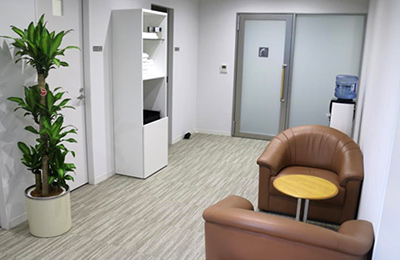
In the summer of 2016, ITOCHU installed a shower lounge on the third floor of our Tokyo Headquarters, and a shower room on the second basement floor. Their goal is to help create a workplace environment that encourages job satisfaction. The seeds of this idea were accounts from employees who often found airport shower rooms crowded when returning from business trips on early morning flights. In response to this feedback, ITOCHU established shower facilities at Headquarters so that employees returning from business trips can be more comfortable as they begin work. The facilities are equipped with overhead shower heads, which warm the body quickly in winter, and amenities like towels, hair driers, shampoo, and conditioner. The facilities have been well received, with employees reporting they are able to work in comfort. The facilities now stay open longer and can also be used by employees who exercise to improve their health. They are also open to employees of affiliate companies.
- Can be used by both full-time and part-time employees
The Men’s Dormitory
In March 2018, ITOCHU Corporation opened the Hiyoshi Dormitory in the Kohoku ward of Yokohama, Kanagawa prefecture. The dormitory has approx. 360 units to house unmarried employees. It brings together unmarried male employees who had been scattered across four locations in the Tokyo Metropolitan area. The design concept for the dormitory is “under the same roof,” as opposed to positioning it as a mere welfare facility. Accordingly, it is equipped with a variety of common areas designed to bring residents together and deepen communication across boundaries like age and department. These include a dining room with shared kitchen, a multi-purpose meeting room, a large bathroom with a sauna, and communication spaces on each floor (including study areas and an open terrace). This contributes to human development through internal networks, and the preservation of our culture.
The dormitory is aiming to create an environment in which employees voluntarily reform their work-styles and improve their health based on the corporate policies such as health management. For example, it serves nutritionally balanced breakfasts and dinners in the cafeteria, it provides exercise opportunities in partnership with a nearby fitness club, and it prohibits smoking throughout the building, including private rooms, except in designated smoking areas.
Moreover, this dormitory is designed to function as a secondary office for the Tokyo Headquarters and is vital to our business continuity plan (BCP) for disasters. It uses the same Internet environment as our offices, and we have installed emergency generator equipment. We have also stocked the dormitory with food, water, emergency supplies and other items.
- Intended for full-time employees and some full-time employees from affiliated group companies.
The Women’s Dormitory
In March 2025, ITOCHU Corporation completed the integration of its two existing women’s dormitories in the Tokyo metropolitan area into a newly constructed facility along the Denen-Toshi Line in Miyamae Ward. Guided by the Under One Roof concept, the new dormitory is designed to be a hub for internal networking and talent development, aiming to deepen vertical, horizontal, and diagonal communication across generational and departmental boundaries. To facilitate this, shared spaces such as a relaxation lounge, an open terrace, and a communal kitchen have been incorporated to promote interactions among residents. Additionally, from the perspective of advancing health management, the dormitory features high-quality bedding to enhance the quality of sleep. These initiatives create an environment where employees beginning their careers at ITOCHU can fully focus on their work.
The facility is environmentally friendly, supporting decarbonization efforts by using timber for the majority of its structural elements, such as columns, beams, and seismic walls (excluding joints), reducing CO2 emissions by 458 tons compared to steel construction. Despite its primarily wooden structure, it meets fire resistance standards equivalent to those of steel and reinforced concrete buildings, ensuring safety and security. Additionally, the residential block has been recognized as a model project in the FYE 2024 Sustainable Building Leading Projects (Wooden Construction Category) program for its role in increasing awareness of advanced wood construction technologies used to build housing and commercial buildings. The communal building is also wooden construction, creating a warm and natural atmosphere.
- Intended for full-time employees.
SOGO-KAI Associations
SOGO-KAI associations are groups where fellow employees can assemble to enjoy the same sports or cultural activities. Spreading out from Tokyo and Osaka, there are more than thirty such associations active within the company nationwide. They boast a combined membership of more than 1,000 employees. The associations are not limited to current ITOCHU Corporation employees. Many former employees and Group company employees also take part. These associations use sports and cultural activities to promote exchange and communication across different generations and organizations.
- Both full-time and part-time employees can join

